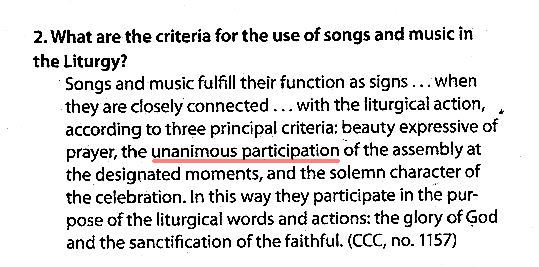Criteria for Sacred Music according to the USCCB
-
I am puzzled by this quote from the USCCB "Catechism for Adults."
How can "unanimous participation" be an essential criterion?
I know I've said this numerous times in the past, but (again) some people cannot sing. No amount of good will or wishful thinking will change this fact. It is a cold, hard fact.
I think we are forced to assume that the participation here must be an interior participation (the same way we "participate" with, for example, the homily).
-
Jeff, are the "designated moments" explained? That would make a difference to me. "Unanimous participation" sort of seems like an inaccurate borrowing from politics: do you vote on it? It certainly isn't something with precedent in liturgical documents.
-
Here's the Latin of the Catechism paragraph 1157. the word is "uanimem""
1157 Cantus et musica suum munus signorum modo eo significantiore conficiunt, « quanto arctius cum actione liturgica connectuntur »90 secundum tria praecipua criteria: pulchritudinem expressivam orationis, unanimem congregationis in momentis praevisis participationem et sollemnem celebrationis indolem. Sic illa finem participant verborum et actionum liturgicarum: gloriam Dei et sanctificationem fidelium:91 -
1157 Singing and music signs his or her duty and prepare the way significantiore him, "how much more closely connected with the liturgical action" 90 in three respects the principal criteria: beauty expressive of prayer, like-minded gathering together unto the seasons, provided the participation and the celebration of solemn character. So that the end of words and participate in the liturgical celebrations: the glory of God and the sanctification of the faithful: 91
google translate -

-
JMO et al,
I think that applying focus upon the implication of the word "unanimous" isn't really germaine to 1157 in toto.
Paraphrase-
Song fulfill(s) function....in a more significant manner when three criteria are enacted.
I don't have any problem with such idealism; who would argue that when those stars align music's function is, in fact, fulfilled? However, as leaders and practicioners of the art, we shouldn't take sole responsibility or fault if those stars don't align every liturgy. If a tone-deaf celebrant hits about 365 different tonal frequencies when chanting "In the Name of the Father, Son and the Holy Spirit" and just one congregant abstains from responding with a sung "amen," that's on that one recalcitrant soul, not the celebrant and not the 99.999% of the congregation who make the effort.
OTOH, as I have only once experienced in my lifetime, you attend Christmas Midnight Mass back in the day, and the congregation not only cannot sing the Haydn Mass setting, but are clearly not invited to enjoin the singing of carols which in baseball parlance is a good pitch to the center of the strike zone guaranteed to be hit outta the park, then that DoM needs to re-examine his/her priorities. -
Another possibility is that 'unanimem' is used to describe 'unanimity' in the sense that the congregants' internal disposition (yes, actuosa) is consonant with the text and sentiment of the music. That is, they are united at least mentally.
And, yes, good luck making THAT happen. -
dad
many of us when grouped together are most definitely mental! -
Or perhaps, as Mrs. Slocombe would say, "...and I am unanimous in this!"Thanked by 1Marc Cerisier
Welcome to the MusicaSacra Forum!
To participate in the discussions on Catholic church music, sign in or register as a forum member, The forum is a project of the Church Music Association of America.
Categories
- All Discussions21,292
- General Music Discussion8,303
- Job Openings217
- Management of Music Programs852
- Choral Matters534
- Church Documents and Rubrics528
- CMAA Notes304
- Events731
- For Newcomers: Read First26
- Sacred Polyphony550
- Hymnody876
- Gregorian Chant: General2,712
- ↳ Graduale Romanum and Liber Usualis370
- ↳ Graduale Simplex60
- ↳ Semiology64
- Vernacular Plainsong698
- Anglican Use and Anglican Chant68
- Organ, Other Instruments and Repertoire438
- New Composition/Works in Progress1,303
- Recordings234
- Music for Hispanic Ministry162
- Music Education: Children213
- Music Education: General222
- News Items245
- Positions Wanted3
- General Discussion: Catholicism740
- Amusements177
- General Discussion1,037
- Opinions119

